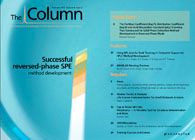Malt whisky find
An investigation into the Scotch malt whisky brewing practices of over 100 years ago has revealed some unexpected results.

An investigation into the Scotch malt whisky brewing practices of over 100 years ago has revealed some unexpected results.1
The opportunity to conduct this experiment arose when three cases of Mackinlay’s Rare Highland Malt Whisky were excavated from Sir Ernest Shackleton’s 1907 expedition base camp hut in Antarctica. Three of the bottles were returned to Scotland in January 2011 where a team from the Whyte and Mackay distillery conducted the first sensory and organoleptic analysis of a Scotch malt whisky distilled in the late 1890s. They analysed the whisky using combined gas chromatography–mass spectrometry and GC-olfactory analysis of fermentation. At a time when Scottish malt whisky was regarded as too peaty and harsh for ordinary consumption, they uncovered a ‘modern’ style of whisky.
The team concluded that their analysis of the excavated whisky changes our understanding of the quality and character of Scotch malt whisky produced in the past centuries.
1. Woods et al., J. Inst. Brew., 117(2), 156–165, (2011).
This story originally appeared in The Column. Click here to view that issue.

New TRC Facility Accelerates Innovation and Delivery
April 25th 2025We’ve expanded our capabilities with a state-of-the-art, 200,000 sq ft TRC facility in Toronto, completed in 2024 and staffed by over 100 PhD- and MSc-level scientists. This investment enables the development of more innovative compounds, a broader catalogue and custom offering, and streamlined operations for faster delivery. • Our extensive range of over 100,000 high-quality research chemicals—including APIs, metabolites, and impurities in both native and stable isotope-labelled forms—provides essential tools for uncovering molecular disease mechanisms and exploring new opportunities for therapeutic intervention.
New Guide: Characterising Impurity Standards – What Defines “Good Enough?”
April 25th 2025Impurity reference standards (IRSs) are essential for accurately identifying and quantifying impurities in pharmaceutical development and manufacturing. Yet, with limited regulatory guidance on how much characterisation is truly required for different applications, selecting the right standard can be challenging. To help, LGC has developed a new interactive multimedia guide, packed with expert insights to support your decision-making and give you greater confidence when choosing the right IRS for your specific needs.

.png&w=3840&q=75)

.png&w=3840&q=75)



.png&w=3840&q=75)



.png&w=3840&q=75)











